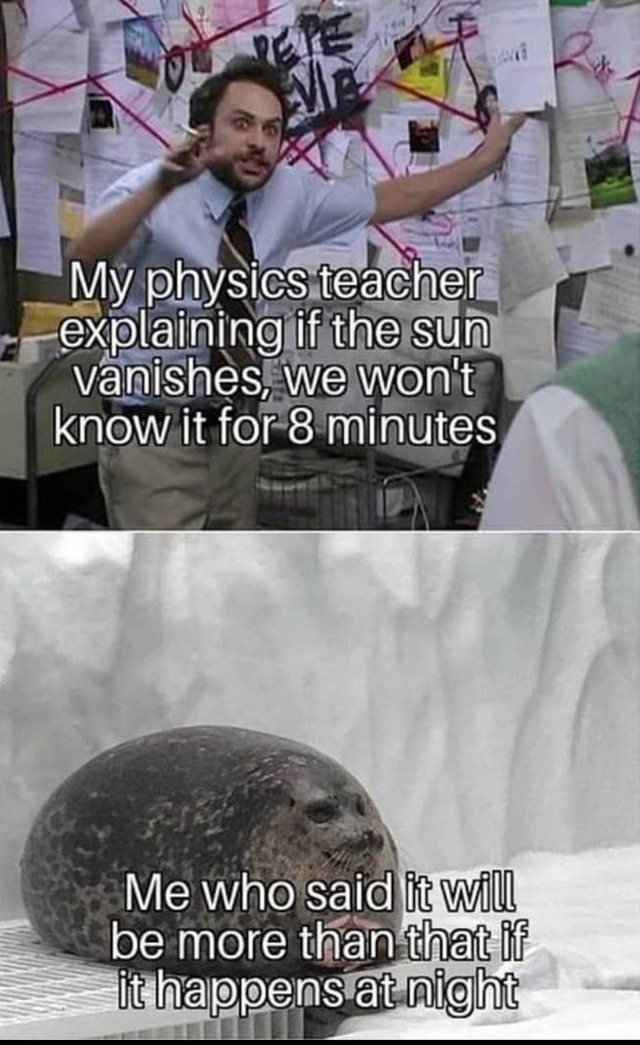this post was submitted on 08 Aug 2024
919 points (98.5% liked)
Science Memes
11552 readers
1352 users here now
Welcome to c/science_memes @ Mander.xyz!
A place for majestic STEMLORD peacocking, as well as memes about the realities of working in a lab.

Rules
- Don't throw mud. Behave like an intellectual and remember the human.
- Keep it rooted (on topic).
- No spam.
- Infographics welcome, get schooled.
This is a science community. We use the Dawkins definition of meme.
Research Committee
Other Mander Communities
Science and Research
Biology and Life Sciences
- !abiogenesis@mander.xyz
- !animal-behavior@mander.xyz
- !anthropology@mander.xyz
- !arachnology@mander.xyz
- !balconygardening@slrpnk.net
- !biodiversity@mander.xyz
- !biology@mander.xyz
- !biophysics@mander.xyz
- !botany@mander.xyz
- !ecology@mander.xyz
- !entomology@mander.xyz
- !fermentation@mander.xyz
- !herpetology@mander.xyz
- !houseplants@mander.xyz
- !medicine@mander.xyz
- !microscopy@mander.xyz
- !mycology@mander.xyz
- !nudibranchs@mander.xyz
- !nutrition@mander.xyz
- !palaeoecology@mander.xyz
- !palaeontology@mander.xyz
- !photosynthesis@mander.xyz
- !plantid@mander.xyz
- !plants@mander.xyz
- !reptiles and amphibians@mander.xyz
Physical Sciences
- !astronomy@mander.xyz
- !chemistry@mander.xyz
- !earthscience@mander.xyz
- !geography@mander.xyz
- !geospatial@mander.xyz
- !nuclear@mander.xyz
- !physics@mander.xyz
- !quantum-computing@mander.xyz
- !spectroscopy@mander.xyz
Humanities and Social Sciences
Practical and Applied Sciences
- !exercise-and sports-science@mander.xyz
- !gardening@mander.xyz
- !self sufficiency@mander.xyz
- !soilscience@slrpnk.net
- !terrariums@mander.xyz
- !timelapse@mander.xyz
Memes
Miscellaneous
founded 2 years ago
MODERATORS
you are viewing a single comment's thread
view the rest of the comments
view the rest of the comments

Wouldn't you see the effect on the moon?
Only if the moon is up.
Moon is a fake bitch.
Imagine seeing the moon just switch off
That would be a beautiful, terrifying sight. You could gaze up at the most amazing view of the stars as the whole world froze to death.
I wonder if you had the opportunity to do so leisurely.
A suddenly vanishing sun would also mean a spectularly high energy gravity wave hitting the earth. You might be dead before even realizing that anything is off...
Would that wave be that destructive? I can definitely see it screwing up the orbits of Jupiter's moons, maybe even our own moon, but would it be much worse than a small earthquake?
The Sun's gravity at Earth's distance is only 0.0059m/s². I'm not exactly certain about how the magnetude of a gravity wave relates to the magnetude of the static force, but even if the force fluctuates rapidly at ten times the static force, that's less than a hundredth of a g; enough to be perceivable but you wouldn't even loose your balance.
I wonder if the sudden change in direction would be the bigger problem, as we no longer had the sun to orbit around.
This is a good question for Randall Monroe, if he hasn’t already addressed it.
I thought the same after writing the gravity wave comment. Really not sure what the effects would be and the equations involved are far from intuitive...
Is Randall doing new What-If stuff? I have only seen old articles on his website recently.
There is a really great short story by Larry Niven based on a similar premise:
"Inconstant Moon"
There is also an "Outer Limits" episode based on this. I watched that before knowing the short story and it is one of only 2 or three OL episodes that I still have an active memory of...
Yup
If you can see the moon (if it is "up" at night).
There's a pretty cool short story where a guy is looking at the full moon and he realizes that it's gotten way too bright, and that could only happen because the sun has just spontaneously exploded, and he basically just makes peace with the fact that the world is going to be destroyed very shortly.
Assuming its midday, and the moon is on or near the horizon, it would actually still be seen for an additional 1.3 seconds after we see the sun disappear. If its high in the sky however, it would disappear only a few ms after the sun, unless it was in a full or partial eclipse, where it would disappear at the same time to our eyes.
Yeah - half a second before seeing it on the sun.